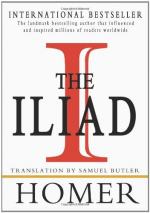|
This section contains 254 words (approx. 1 page at 400 words per page) |

|
The Iliad Summary & Study Guide Description
The Iliad Summary & Study Guide includes comprehensive information and analysis to help you understand the book. This study guide contains the following sections:
This detailed literature summary also contains Further Study and a Free Quiz on The Iliad by Homer.
For all practical purposes, Western literature begins with the Iliad. The Epic of Gilgamesh, while at least 1,000 years older, is neither as well-known nor as influential as Homer's work. We still use expressions like "Achilles' heel," "Trojan horse," or "the face that launched a thousand ships," all with roots in the Iliad or the mythic cycle on which it is based, nearly 3,000 years after the poem was written. And at least in terms of the number of copies to survive from antiquity, the poems of Homer are second only to the Bible in popularity.
Although "Iliad" means "the story of Ilion," or Troy, the poem has much more to say about Achilles and Hector than it does about Troy. As the first word of the Greek text suggests ("Rage! Goddess, sing the rage of Peleus's son Achilles"), this poem has a lot to do with anger. Honor, glory, and fate are also frequent themes.
Among the things for which the Iliad is most famous are its use of epithets, or formulaic phrases to describe an individual, an object, or even some events. Also noteworthy is the poem's masterful use of similes.
For more than 1,500 years the Iliad and the Odyssey set the standard by which epic poetry, if not all poetry of any kind, was judged. The epic form in poetry has not been widely practiced since the appearance of John Milton's Paradise Lost in 1667, but the story of the fall of Troy has remained a perennial favorite to the present day.
Read more from the Study Guide
|
This section contains 254 words (approx. 1 page at 400 words per page) |

|



